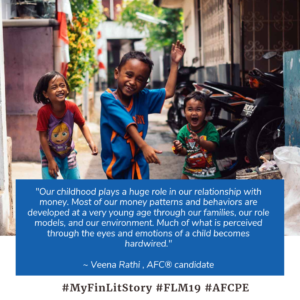My relationship with money has changed over the years. As a child my first memory of money was receiving some change from my dad who was of Indian descent. I remember giving a dollar to my best friend for her 9th birthday. My mom and dad owned a store and had a taxi business and were always working hard. I developed some entrepreneurial skills from my dad; and at 11 years old, I sold little coconut toffees, which my mother made, to my school friends. Fresh fish, crabs, lobsters, and fruit was very abundant and less was always more. My father handed me his department store card to purchase a pair of sneakers at 13. It wasn’t a credit card but an account that he could charge on and pay off within 30 or 60 days.
Growing up in the Islands enabled me to experience another culture that evolves around loving, giving, and sharing. Walking barefoot on the sand and playing with nature was extremely special. The Fijians believe that everyone’s needs come before your own; therefore, there is a need to have good relationships with the family and the community which enhances a sense of belonging. Money is supposed to be shared, and to fit in within that society you’ve got to give, give, and give. The traditional ceremonies would engage the entire village and feasting would last for weeks during weddings and funerals. This, too, has changed as people recognize that other things are important to them.
The Indian culture views money and education as power and security and safety. When it comes to finding your life partner typically the first questions that arise are, “Does he or she have money?” “Is he or she a doctor, a lawyer, an engineer?” The person may be loving, kind, and compassionate but that doesn’t really matter. Money is always at the forefront, and we keep trying to earn more. Many have self-fulfillment needs. But over the years, people have begun to view money differently. They are giving money personal meaning based on what they value now.
As a money coach, and having the experience of living and studying abroad, I’ve experienced different cultures and traditions from a diverse background. I consider myself to have the traits of a magician archetype, where I am characteristically optimistic and financially balanced. Yet sometimes, I can act innocent and start spending what I don’t have. I also have the qualities of a martyr, where I can get obsessed with taking care of others and neglect my own needs. The experience of talking to so many people from different parts of the world confirms, money is a core survival issue – one that most have very little and any preparation for. And, despite having advanced so much technologically, when it comes to money our behaviors are generally more emotional and reactive rather than rational and logical. In many ways, we still behave like hunters and gatherers, only now we gather at workplaces and shopping malls.
Our childhood plays a huge role in our relationship with money. Most of our money patterns and behaviors are developed at a very young age through our families, our role models, and our environment. Much of what is perceived through the eyes and emotions of a child becomes hardwired. This is, in part, why we have so many conflicting thoughts, feelings, and emotions about money. It’s why some people with means are still stressed and obsessed over money, while others with very little are happy and smiling.
We all have a money biography – some have bigger stories than others. Some of us are more attached to our stories and are committed to maintaining our part in the script as our legacy. Others feel ashamed and embarrassed to share our stories. Whatever your story is, hopefully you can share it so you can witness it objectively and consciously.
Values and beliefs are important and very sensitive subjects, but they can change over time, especially around money, which is needed for survival. Seeking to possess money without understanding the true meaning and purpose of your life will only leave you feeling more conflicted and unfulfilled. Until this understanding happens, you remain enslaved by the money and the material world. We have all have traveled too far only to arrive at our destination having left the gift at the altar. The real journey is not about money, it is about your path and your purpose. The closer you get to the truth, the closer you are to the source of the invisible supply, which is limitless and available to us all. By beginning to understand your underlying unconscious feelings and beliefs about money, you will become better prepared to make good financial decisions. Your relationship will money can change and improve the quality of your life.
Money is not the answer to everything but it does make a big difference.
~ Veena Rathi , AFC® candidate
#MyFinLitStory #FLM19

What an amazing story Mrs. Rathi! Having been to Fiji myself, I loved everything about the people, places, food and culture! I’m inspired by your story and aspire to have a great money story of my own one day! 🙂
Regards,
I feel the honesty and realness in your story. Your determination is going to turn me into a true believer in myself when it comes to money. I’m so thankful to have you as my coach. Blessings!